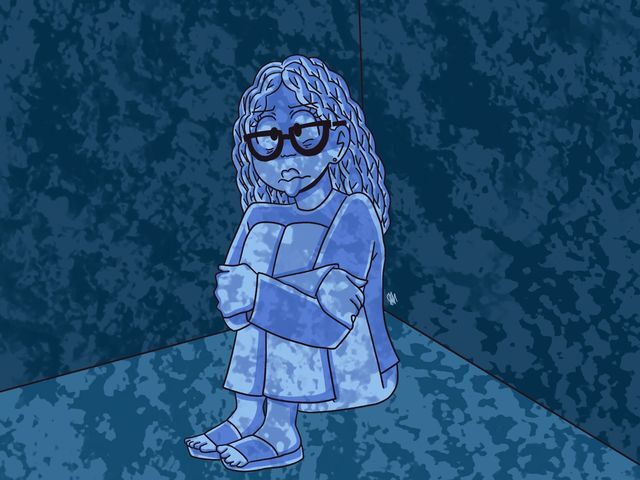Bright-eyed, 18 years old and unquestionably innocent, I moved into my Texas State on-campus dorm both excited to make new friends and because of Texas State’s freshman housing requirement. I signed my housing contract, purchased the required meal plan and hoped to form the close communities found in movies, television and books.
Instead, life at Retama Hall turned out to be drastically different.
In Retama, where acting and musical theater majors are forced to make their home, I suffered multiple panic attacks, cried daily and lost over 20 pounds. I developed an eating disorder from the overwhelming stress and lack of food options on campus and had a fellow freshman break into my room, screaming at me while I sobbed on my twin bed.
The dorm, for me, was a cesspit for sickness and anxiety to spread. This sump should not be forced on any student, regardless of age or status. On-campus living should be a choice for freshmen, not a requirement.
Texas State’s housing policy states new freshmen under the age of 20 with less than 30 credit hours must live in on-campus housing. Students who graduated from high school within the past 12 months of the semester of their admission are also bound to dorms. Once a student signs the required housing contract, they’re unable to move out in the spring semester, regardless of whether they turn 20 or reach 30 credit hours.
For 98.8% of first-time freshmen this fall, Texas State’s housing policy meant they were forced to live on campus without a choice. Living on campus can take a financial, physical, emotional and mental toll on students.
Sharing a room in a traditional dorm can be more expensive than living in a private bedroom in a four-bedroom apartment. The cost of living for four months in Beretta Hall, one of Texas State’s traditional dorms where students share a room and community bathroom, is $2,967. At a nearby student housing apartment, such as the Pointe, students can have their own room and bathroom for as low as $2,500 for the same four-month period with a few roommates. Additionally, students living in off-campus housing are exempt from paying dorm fees if they decide to stay in San Marcos over winter break.
When it comes to food, the required meal plan at Texas State starts at $1,355 per semester, whereas groceries for four months in Texas average $640.
Students and their families should not be forced to take on the excessive financial burden of on-campus housing. Instead, students who want the “college dorm experience” should choose to pay the extra funds, while other students can choose to save their money.
Inside of a traditional dorm, students often lose valuable hours of sleep. Government studies show chronic sleep loss can lead to anxiety, depression, obesity, disease and alcohol use. For Jane Doe, an anonymous theater student whose roommate stays up with the light on to study, Lantana Hall has provided no solid nights of sleep.
“All of my classes are telling me to get enough sleep,” Doe said. “We need around eight hours of sleep, and now I’m lucky if I get four hours of uninterrupted sleep, which is ridiculous.”
Doe’s nutritional balance has also been thrown off since moving into a dorm. As an on-campus resident, she is forced to purchase a meal plan, where she has few healthy options to choose from. Commons and Harris dining halls use canola oil in almost all their dishes, even those that seem more nutritious, which contains saturated fats that can lead to heart disease. In terms of retail options, Create, Chick-fil-A and Revolution Noodle are some of the few options with fresh vegetables.
“When I was using my meal swipes, I would feel physically sick,” Doe said. “So, now, I’m having to pay out of pocket for my meals and because we don’t have a sink or a stove in our dorms, it’s only the communal one downstairs which is often not well taken care of. I’m still using microwavable meals instead of cooked meals.”
Most microwavable meals do not provide adequate nutrition and substance to young adults, and they are often packed with preservatives and added sugars. The Chartwells website links to Weight Watchers as a weight management source, but Weight Watchers’ 190-calorie “meals“ do not provide enough calories for the average 2,000 calorie diet. As a result, using microwavable meals to get by leaves freshmen trapped on-campus at risk for heightened anxiety and depression simply from malnourishment.
Beyond the financial, physical and mental effects for average students forced to share a room and eat from a meal plan, racism and gender differences create uncomfortable experiences that could be avoided in off-campus apartments.
When Doe, a woman of color, makes food in her common area, she’s had other students comment on the look and smell. When male students come down to the first floor, they have commented on her towel as she steps out of the community shower.
Additionally, students who identify as non-binary are forced to room with their biological sex. In an off-campus apartment, students like Doe can make food without passerby judgment. They can change from a towel in their own bathroom, without worries that men could walk by and make comments. Gender-fluid residents would not be forced to identify, and they could have their fluidity respected.
If students were given the simple choice of living on or off campus, all of these issues could be avoided. Those who want to live in a dorm could purchase a housing plan and those who want to opt-out can turn their attention off-site.
In February, Nadia Gonzales, a public relations senior and fellow opinions contributor, wrote a column arguing the benefits of an on-campus traditional dorm. She argues the benefits of socialization, citing that sharing a room can alleviate loneliness, and she spoke to students who enjoyed being close to Alkek Library and the Student Recreation Center. These are wonderful points, and she proves that the on-campus experience can be quite beneficial.
However, life on campus is different for each student. Like Doe, students of color living in a dorm might experience racism at higher rates than in their private, chosen apartment. Sleep and nutrition are easier to maintain in your own room, and financially, living off-campus is cheaper to maintain. Not to mention, in a dorm, students can’t control whether fellow residents opt to wear face masks.
Because of the unique experiences of each on-campus student, the financial cost of living in a dorm and the mental, physical, racial and social consequences on student health, Texas State should repeal its housing policy and stop locking students into an eight-by-twelve-foot box.
Housing should be a choice, not a prison sentence.
– Payton Russell is an acting senior
The University Star welcomes Letters to the Editor from its readers. All submissions are reviewed and considered by the Editor-in-Chief and Opinion Editor for publication. Not all letters are guaranteed for publication.
Opinion: Freshman should not be forced to live on campus
Payton Russell, Opinion Contributor
December 21, 2021
0
Donate to The University Star
Your donation will support the student journalists of Texas State University. Your contribution will allow us to purchase equipment and cover our annual website hosting costs.
More to Discover














